FOURTH PARTY OPERATORS
Page 48
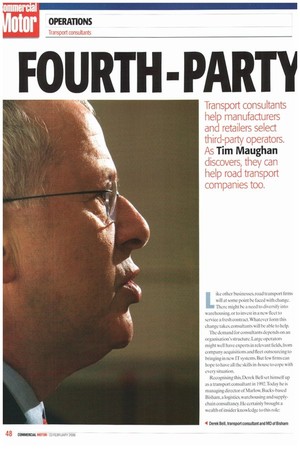
Page 49
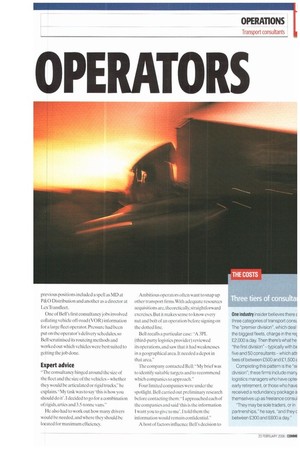
Page 50
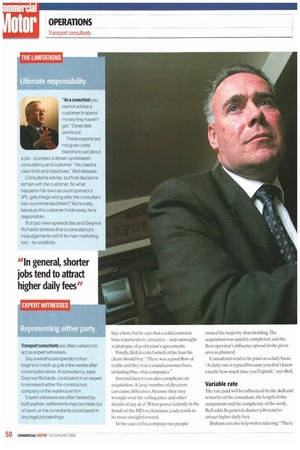
Page 51
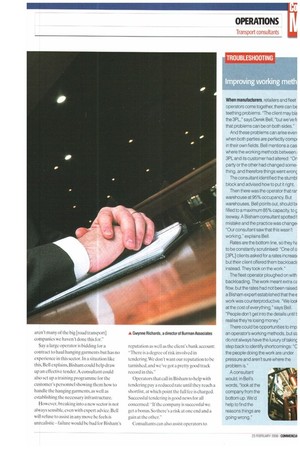
Page 52
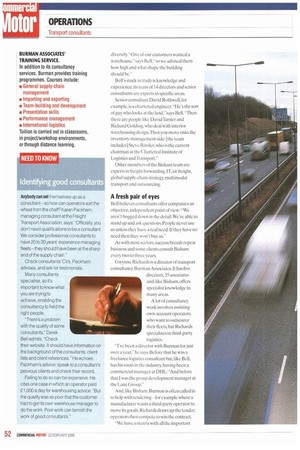
Page 53
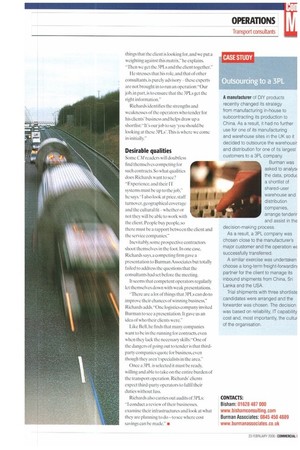
If you've noticed an error in this article please click here to report it so we can fix it.
Transport consultants
help manufacturers and retailers select third-party operators.
As Tim Maughan
discovers, they can help road transport companies too.
Like other businesses, road transport I irms will at some point be faced with change. There might be a need to diversify into warehousing. or to invest in a new fleet to service a fresh contract. Whatever form this change takes, consultants will be able to help.
The demand for consultants depends on an organisation's structure. Large operators might well have experts in relevant fields, from company acquisitions and fleet outsourcing to bringing in new IT systems. But few firms can hope to have all the skills in-house to cope with every situation.
Recognising this, Derek Bell set himself up as a transport consultant in 1992.Today he is managing director of Marlow. Bucks-based Bisham,a logistics, warehousing and supplychain consultancy. He certainly brought a wealth of insider knowledge to this role: previous positions included a spell as MD at P&O Distribution and another as a director at LexTransfleet.
One of Bell's first consultancy jobs involved collating vehicle off-road ('VOR ) information for a large fleet operator. Pressure had been put on the operator's delivery schedules, so Bell scrutinised its routeing methods and worked out which vehicles were best suited to getting the job done.
Expert advice
"The consultancy hinged around the size of the fleet and the size of the vehicleswhether they would be articulated or rigid trucks." he explains."My task was to say'this is how you should do it'.! decided to go for a combination of rigids, artics and 3.5-tonne vans."
He also had to work out how many drivers would be needed, and where they should he located for maximum efficiency. Ambitious operators often want to snap up other transport lirms.Vvith adequate resources acquisitions are, theoretically, straightforward exercises. But it makes sense to know every nut and bolt of an operation before signing on the dotted line.
Bell recalls a particular case: "A 3P1. (third-party logistics provider) reviewed its operations, and saw that it had weaknesses in a geographical area. It needed a depot in that area."
The company contacted Bell: "My brief was to identify suitable targets and to recommend which cornpanies to approach."
Four limited companies were under the spotlight. Bell carried out preliminary research before contacting them: "I approached each of the companies and said 'this is the information want you to give to me'. I told them the information would remain confidential.
A host of factors influence Bell's decision to buy a firm. but he says that a solid contracts base is particularly attractive and outweighs a catalogue of gentleman's agreements, Finally, Bell decided which of the four his client should buy:"There was a good flow of traffic and they had a sound customer base, including blue-chip companies."
Internal factors can also complicate an acquisition. A large number of directors can cause difficulties, because they may wrangle over the selling price and other details of any dea Miler) power is firmly in the hands of the MD or ch airman, a sale tends to he more straightforward.
In the case of this company two people owned the majority shareholding.The acquisition was quickly completed, and the fleet operator's inlluence spread in the given area as planned.
Consultants tend to be paid on a daily basis. "A daily rate is typical because you don't know exactly how much time you'll spend," says Bell.
Variable rate
The rate paid will he influenced by the skill and seniority of the consultant, the length of the assignment and the complexity of the work, Bell adds. In general. shorter jobs tend to attract higher daily fees.
Bisham can also help with tendering:"There aren't many of the big [road transport] companies we haven't done this for."
Say a large operator is bidding for a contract to haul hanging garments but has no experience in this sector. In a situation like this. Bell explains. Bisham could help draw up an effective tender.A consultant could also set up a training programme tbr the customer's personnel showing them how to handle the hanging garments. as well as establishing the necessary infrastructure.
However, breaking into a new sector is not always sensible, even with expert advice. Bell will refuse to assist in any move he feels is unrealistic — failure would be had for Bisham's reputation as well as the client's hank account: "There is a degree of risk involved in tendering.We don't want our reputation to he tamished,and we've got a pretty good track record in this."
Operators that call in Bisham to help with tendering pay a reduced rate until they reach a shortlist, at which point the full fee is charged. Successful tendering is good news for all concerned: "If the company is successful we get a bonus. So there's a risk at one end and a gain at the other."
Consultants can also assist operators to cliversify."One of our customers wanted a warehouse." savs Bell,"so we advised them how high and what shape the building should be."
Bell's stock in trade is knowledge and experience: its team of 14 directors and senior consultants are experts in specific areas.
Senior consultant David Rothwell. for example. is a chartered engineer."He's the sort of guy who looks at the land." says Bell."Then there are people like David 'Rimer and Richard Golding. who deal with interior warehousing design. Then you move onto the inventory-management side: [the team includes] Steve Rinsler, who is the current chairman at the Chartered Institute of Logistics and Transport."
Other members of the Bisham team are experts in freight forwarding. IT, air freight. global supply-chain strategy, multimodal transport and outsourcing.
A fresh pair of eyes Bell believes consultants offer companies an objective, independent point of view: "We aren't bogged down in the detail, We're able to stand up and ask questions People never use us unless they have a real need. If they have no need then they won't buy us."
As with most sectors, success breeds repeat business and sonic clients consult Bisham every two to three years.
Gwynne Richards is a director of transport consultancy Burman Associates. It has five directors, 35 associates and, like Bisham,offers specialist knowledge in many areas.
"I've been a director with Burman for just over a year," he says. Before that he was a freelance logistics consultant but.like Bell. has his roots in the industry, having been a commercial manager at DH L: And before that! was the group development manager at the Lane Group."
And, like Bisham, Burman is often called in to help with tendering — for example where a manufacturer wants a third-party operator to move its goods. Richards draws up the tender; operators then corn pete to win the contract.
"We have a matrix with all the important things that the client is looking for. and we put a weighting against this matrix." he explains. "Then we get the 3PLs and the client together.
I-le stresses that his rote, and that of other consultants, is purely advisory -these experts are not brought in to run an operation:"Our job. in part. is to ensure that the 3PLs get the right information."
Richards identifies the strengths and weaknesses of the operators who tender for his clients' business and helps draw up a shortlist:"It's our job to say 'you should he looking at these 3PLs'.1'his is where we conic in initially."
Desirable qualities
Some CM readers will doubtless find themselves competing for such contracts. So what qualities does Richards want to see? "Experience. and their IT systems must be up to the job.he says."I also look at price, staff turnover,geographical coverage and the cultural fit whether or not they will be able to work with the client. People buy people, so there must be a rapport between the client and the service companies."
Inevitably.some prospective contractors shoot themselves in the foot. In one case. Richards says, a competing firm gave a presentation to Burman Associates hut totally failed to address the questions that the consultants had set before the meeting.
It seems that competent operators regularly let themselves down with weak presentations.
"There are a lot of things that 3PLs can do to improve their chances of winning business." Richards adds."One logistics company invited Burman to see a presentation. It gave us an idea of who their clients were."
Like Bell, he finds that many companies want to he in the running for contracts. even when they lack the necessary skills:"One of the dangers of going out to tender is that thirdparty companies quote for business.even though they aren't specialists in the area."
Once a 3PL is selected it must be ready, willing and able to take on the entire burden of the transport operation. Richards clients expect third-party operators to fulfil their duties without fuss.
Richards also carries out audits of 3PLs: "I conduct a review of their businesses. examine their infrastructures and look at what they are planning to do to see where cost savings can he made." •




























































































































































































